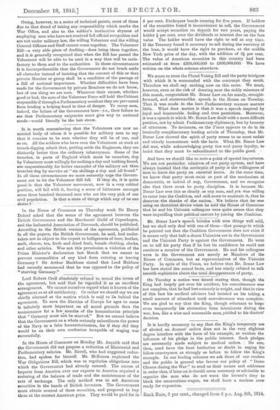In the House of Commons on Monday Mr. Asquith said
that the Government did not propose a reduction of Ministerial and parliamentary salaries. Mr. Birrell, who had suggested reduc- tion, had spoken for himself. Mr. McKenna explained the War Obligations Bill, which was to regularize obligations into which the Government had already entered. The excess of imports from America over our exports to America required a restoring of the balance of trade and the maintenance of the rate of exchange. The only method was to sell American securities in the hands of British investors. The Government must obtain control of these securities, and proposed to buy them at the current American price. They would be paid for in 5 per cent. Exchequer bonds running for five years. If holders of the securities found it inconvenient to sell, the Government would accept securities on deposit for two years, paying the holder per cent. over the dividends or interest duo on the face value The holder would have the right to sell at any time. If the Treasury found it necessary to sell during the currency of the loan, it would have the right to purchase, at the middle New York price of the day, with the addition of 21 per cent. The value of American securities in this country had been estimated at from 000.000,000 to £800,000,000. We have written on the whole scherne elsewhere.










































 Previous page
Previous page